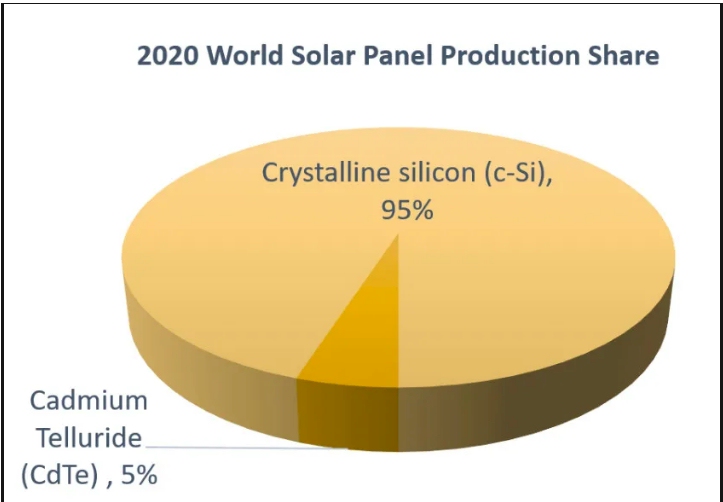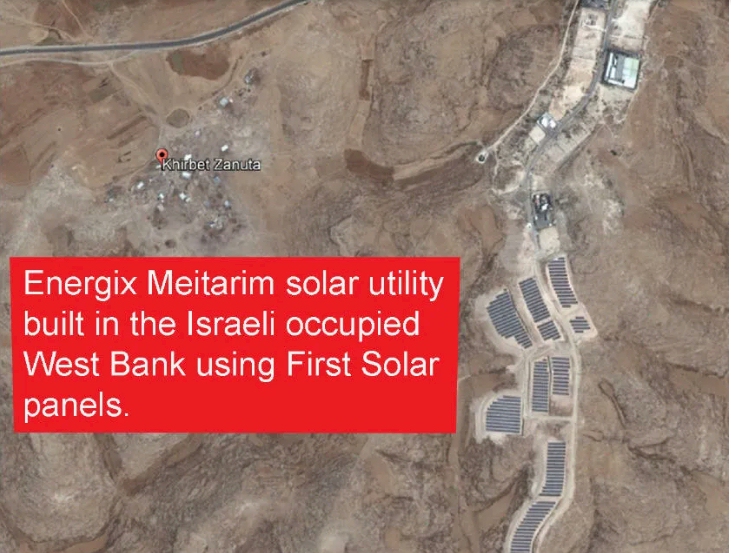Additional research provided by Jeanne Trabulsi and Jennifer Timmons, Virginia Coalition for Human Rights.
Energix Renewable Energies, Ltd. is an Israeli company accustomed to building out its business on the back of huge subsidies. Overseas, the subsidies take the form of free or Israeli controlled foreign territory, solar and wind resources. In the U.S., Energix is absorbing tens of millions in federal solar energy tax credits. Unfortunately for populations neighboring Energix sites overseas and in Virginia, the Israeli company has contractually locked itself into using solar panels containing toxic heavy metals, rather than the mostly inert silicon panels used by 95 percent of the world.
Energix built its Meitarim solar utility in the Israeli occupied West Bank using 104,000 solar panels provided by the Arizona based company, First Solar.

Source: Google Earth satellite image
In April 2019, Energix executed a series of agreements with First Solar for the purchase of panels totaling approximately USD 120 million for the years 2019-2021 for projects in the United States and in Israel. The primary reason for the purchase was locking in the maximum amount of U.S. solar energy tax credits. The solar energy investment tax credit was gradually to be reduced from 30 percent, at that time, to zero by 2022.
Energix declared in its financial statements that the First Solar panel order locked in the maximum rate as “systems in development.” Energix clarified that, “It should be noted that in accordance with United States law, the purchase of equipment that is at least 5 percent of the cost of construction of any project by 2019 will allow that project to maintain the tax benefit rate of 30 percent (hereinafter: “ITC”), provided that the construction of the project is completed by 2023. Accordingly, due to this purchase, Energix has panels worth approximately USD 65 million that are expected to be used to maintain the ITC tax benefit rate of 30 percent.”
In 2020, Energix converted investment tax credits into $48 million in cash with the help of its tax partner Morgan Stanley. Whatever revenue shortfalls are created by Energix subsidies will either be offset by American taxpayers or added to the ballooning budget deficit. Or, put another way, Americans are subsidizing the private profits and infrastructure buildout of an Israeli company operating in Israeli occupied territories. In 2020, Energix occupied slot number 32 on the United Nations High Commissioner for Human Rights list of companies profiting from Israel’s illegal occupations.

One of the reasons Energix selected First Solar (est. 1999) as a key supplier is that the company exclusively manufactures cadmium telluride (CdTe) solar panels, which it claims are 21.5 percent more efficient than multi-crystalline silicon-based panels and cost less than $0.43-$0.46 per watt. According to the U.S. Department of Energy and HIS Markit, CdTe solar cells made up only about 5 percent of world production in 2020, which is dominated by crystalline silicon. One reason for this low market penetration is that unlike silicon, CdTe is a toxic heavy metal.
Several studies have shown that CdTe is toxic to mammalian cells and can cause severe pulmonary inflammation and fibrosis. Solar panels exposed to the elements over decades of solar generation are vulnerable. A study by the EU Ministry of Economic Affairs found that water can wash contaminants out of solar panels in a matter of months. Leaching also occurs when CdTe panels are sent to landfills, where one test found that “over the course of 30 days, 73 percent of the Cd and 21 percent of the Te were released.”
The release of CdTe into the environment surrounding active solar utilities is not a purely hypothetical matter. In 2015, a single tornado destroyed 170,000 CdTe panels at the Desert Sunlight 550-megawatt facility in the Mojave Desert. Rather than building solar facilities in remote areas, Energix frequently locates its Virginia solar plants on prime agricultural lands and near residential areas and even close to major tourism and recreation facilities. Under Virginia state law, counties must give the final permitting approval for large scale solar utilities. Most counties have little regulatory guidance through local solar zoning laws or experience with large projects.
Fortunately for communities surrounding non-Energix solar sites, companies in the U.S. SunPower, Violet Power and Merlin Solar and other such companies, manufacture and supply competitive silicon solar panels. But manufacturers like SunPower, with its extensive commitment to UN human rights principles, would likely reject an operation like Energix, given its violations of international human rights and Israel’s own plummeting human rights record.
Even as First Solar funds studies refuting potential harm from its panels, some Virginia jurisdictions remain unconvinced. In 2020, Prince George County altogether banned toxic heavy metals mandating, “All solar energy facility structures, racks and associated facilities shall have a non-reflective finish or appearance. Silicon based, or similar, panels shall be used; cadmium-based panels are prohibited.” Spotsylvania County—without passing an outright ban—appeared to approve an Apex Energy site permit on the condition that the panels had to be silicon rather than CdTe panels purchased from First Solar.
Unfortunately, by the time Prince George County passed the regulation, the 20-megawatt Energix Rives Road site was already fully permitted. Most neighboring communities, in counties surrounding the estimated 20 sites in the Energix Virginia pipeline, do not ban CdTe or have much awareness about the issue. The Israeli company and its engineering and landowner partners continue to successfully—and mostly from behind the scenes—ram through permit applications to harvest the maximum amount federal tax credits and megawatts generated by installing the toxic solar panels that 95 percent of the world market rejects.


